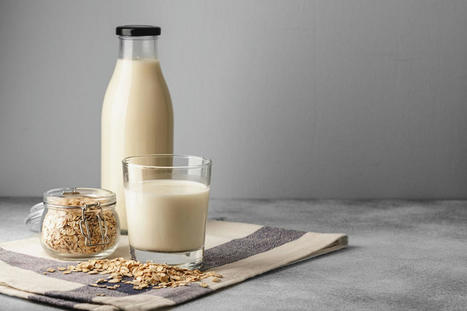For individuals switching to non-dairy and plant-based diets, can oat milk be a beneficial substitute for non-dairy milk drinkers?
Oat Milk
Oat milk is a dairy-free, lactose-free alternative nearly free of saturated fats, has more protein than most nut-based kinds of milk, adds fiber, and offers a healthy dose of B vitamins and minerals. It contains steel-cut or whole oats soaked in water that are then blended and strained with a cheesecloth or special milk bag that is cheaper to make than almond milk and is environmentally friendly.
Nutrition
Individuals can acquire 27% of daily calcium, 50% of daily vitamin B12, and 46% of daily B2. The nutritional information is for one serving of 1 cup of oat milk. (USDA FoodData Central. 2019)
- Calories - 120
- Fat - 5 grams
- Sodium - 101 milligrams
- Carbohydrates - 16 grams
- Fiber - 1.9 grams
- Sugars - 7 grams
- Protein - 3 grams
- Calcium - 350.4 milligrams
- Vitamin B12 - 1.2 micrograms
- Vitamin B2 - 0.6 milligrams
Carbohydrates
- According to the United States Department of Agriculture, the number of carbohydrates in a cup of oat milk is 16, higher than other milk products.
- However, the carbohydrates come from fiber and not fat.
- Because oat milk is made from steel-cut or whole oats, there is more fiber per serving than cow’s milk, which offers no fiber, and almond and soy, which only contain one gram of fiber per serving.
Fats
- Oat milk contains no fatty acids, no total saturated fat, and no total trans fats.
- The milk does have 5 grams of total lipid fats.
Protein
- Compared to cow’s and soy milk, oat milk has less protein, with only 3 grams per serving.
- But compared to other substitutes, like almond milk and rice milk, oat milk provides more protein per serving.
- This is beneficial for individuals following a vegan or dairy-free diet.
Vitamins and Minerals
- Oat milk contains thiamin and folate, both B vitamins necessary for energy production.
- The milk also has minerals, including copper, zinc, manganese, magnesium, and trace amounts of vitamins and minerals such as vitamin D, A IU, riboflavin, and potassium.
- Most commercial oat milk is fortified with vitamins A, D, B12, and B2.
Calories
- One serving of oat milk, about 1 cup, provides approximately 120 calories.
Benefits
Dairy Milk Alternative
- Dairy allergies are common.
- Around 2 to 3% of children younger than three years old are allergic to milk. (American College of Allergy, Asthma & Immunology. 2019)
- 80% outgrow the allergy, but the remaining 20% still deal with the allergy into adulthood, making dairy alternatives necessary.
- An alternative to dairy milk for:
- Allergies to dairy
- Lactose intolerance
- Following a vegan/dairy-free diet
- Oat milk offers some of the same health benefits as cow's milk, that include:
- Protein to build and repair tissues.
- Maintain hair and nail health.
- Calcium for strong bones.
- Macronutrients like folate help make red and white blood cells.
Lowers Cholesterol
- A review determined that consuming oats and oat products has a profound effect in lowering total and LDL cholesterol levels. (Susan A Joyce et al., 2019)
- The researchers found significant support between oat beta-glucans and blood cholesterol levels, showing that adding oats to one's diet can help lower the risk of cardiovascular disease.
Cancer Fighting Properties
- According to a review of plant-based milk alternatives, oat milk may contain anti-cancer properties and high nutritional value. (Swati Sethi et al., 2016)
Bowel Movement Regulation
- Because a great deal of carbohydrates in oat milk come from fiber, it is also higher in fiber than regular milk.
- Fiber can help because the nutrient absorbs water to regulate bowel movements and decrease constipation.
- Only 5% of the population acquires daily fiber recommendations, making oat milk a healthy option. (Diane Quagliani, Patricia Felt-Gunderson. 2017)
Eco Friendly
- Today the world is more mindful of the environmental impacts of farming. (American Society for Nutrition. 2019)
- Spending on alternative milk has risen, and the consumption of dairy milk has dropped, not only for the benefits and taste but because of environmental concerns.
- Dairy milk uses nine times more land to make one liter compared to rice milk, soy milk, almond milk, or oat milk.
Allergies
- Oat milk is a beneficial alternative for individuals who are lactose intolerant or suffer from any other type of dairy allergy or those who have a nut allergy and can't drink almond milk.
- However, individuals should be careful of intake if they have celiac disease or any type of wheat allergy/sensitivity.
- Individuals can still drink oat milk, but the labels need to be read to make sure the product contains gluten-free wheat.
- Oats are gluten-free, but manufacturers often process them using the same equipment as other wheat products, which could cause a reaction.
Adverse Effects
- Oat milk can contain acidity-regulating phosphates, which are common additives in processed foods and are linked to kidney disease.
- Individuals will want to watch oat milk intake if they are prone to kidney stones. (Girish N. Nadkarni, Jaime Uribarri. 2014)
- Individuals who eat a lot of processed foods might want to rotate with another non-dairy alternative milk to limit phosphate consumption.
Varieties
- Many companies have their own oat milk, which is available at grocery and health food stores.
- Additionally, the milk may come in multiple flavors, including vanilla and chocolate.
- Several companies have also used their milk to create dairy-free ice creams.
- Oat milk is available year-round.
- Once opened, place store-bought oat milk in the refrigerator that will last 7 to 10 days.
Preparation
- Individuals can make their own oat milk.
- Use rolled or steel-cut oats with water, blend together, and strain.
- Place the oats in a large bowl, cover them with water, and soak for at least four hours.
- The next day, drain, rinse, blend in cold water, strain, and whisk.
Functional Medicine's Influence Beyond Joints
The information herein is not intended to replace a one-on-one relationship with a qualified healthcare professional or licensed physician and is not medical advice. We encourage you to make healthcare decisions based on your research and partnership with a qualified healthcare professional. Our information scope is limited to chiropractic, musculoskeletal, physical medicines, wellness, sensitive health issues, functional medicine articles, topics, and discussions. We provide and present clinical collaboration with specialists from various disciplines. Each specialist is governed by their professional scope of practice and their jurisdiction of licensure. We use functional health & wellness protocols to treat and support care for the injuries or disorders of the musculoskeletal system. Our videos, posts, topics, subjects, and insights cover clinical matters, issues, and topics that relate to and directly or indirectly support our clinical scope of practice.* Our office has reasonably attempted to provide supportive citations and identified the relevant research studies or studies supporting our posts. We provide copies of supporting research studies available to regulatory boards and the public upon request.
We understand that we cover matters that require an additional explanation of how it may assist in a particular care plan or treatment protocol; therefore, to discuss the subject matter above further, please contact Dr. Alex Jimenez or contact us at 915-850-0900.
Dr. Alex Jimenez DC, MSACP, CCST, IFMCP*, CIFM*, ATN*
email: coach@elpasofunctionalmedicine.com
Licensed in: Texas & New Mexico*
References
USDA FoodData Central. (2019). The Original Oat-Milk.
American College of Allergy, Asthma & Immunology. (2019). Milk & Dairy.
Joyce, S. A., Kamil, A., Fleige, L., & Gahan, C. G. M. (2019). The Cholesterol-Lowering Effect of Oats and Oat Beta Glucan: Modes of Action and Potential Role of Bile Acids and the Microbiome. Frontiers in nutrition, 6, 171. https://doi.org/10.3389/fnut.2019.00171
Sethi, S., Tyagi, S. K., & Anurag, R. K. (2016). Plant-based milk alternatives an emerging segment of functional beverages: a review. Journal of food science and technology, 53(9), 3408–3423. https://doi.org/10.1007/s13197-016-2328-3
Quagliani, D., & Felt-Gunderson, P. (2016). Closing America's Fiber Intake Gap: Communication Strategies From a Food and Fiber Summit. American journal of lifestyle medicine, 11(1), 80–85. https://doi.org/10.1177/1559827615588079
American Society for Nutrition. (2019). Going nuts about milk? Here’s what you need to know about plant-based milk alternatives.
Nadkarni, G. N., & Uribarri, J. (2014). Phosphorus and the kidney: What is known and what is needed. Advances in nutrition (Bethesda, Md.), 5(1), 98–103. https://doi.org/10.3945/an.113.004655



 Your new post is loading...
Your new post is loading...









A lactose-free alternative with more protein than most nut-based milks. Oat milk also adds fiber and provides healthy B vitamins and minerals. For answers to any questions you may have, please call Dr. Jimenez at 915-850-0900 or 915-412-6677